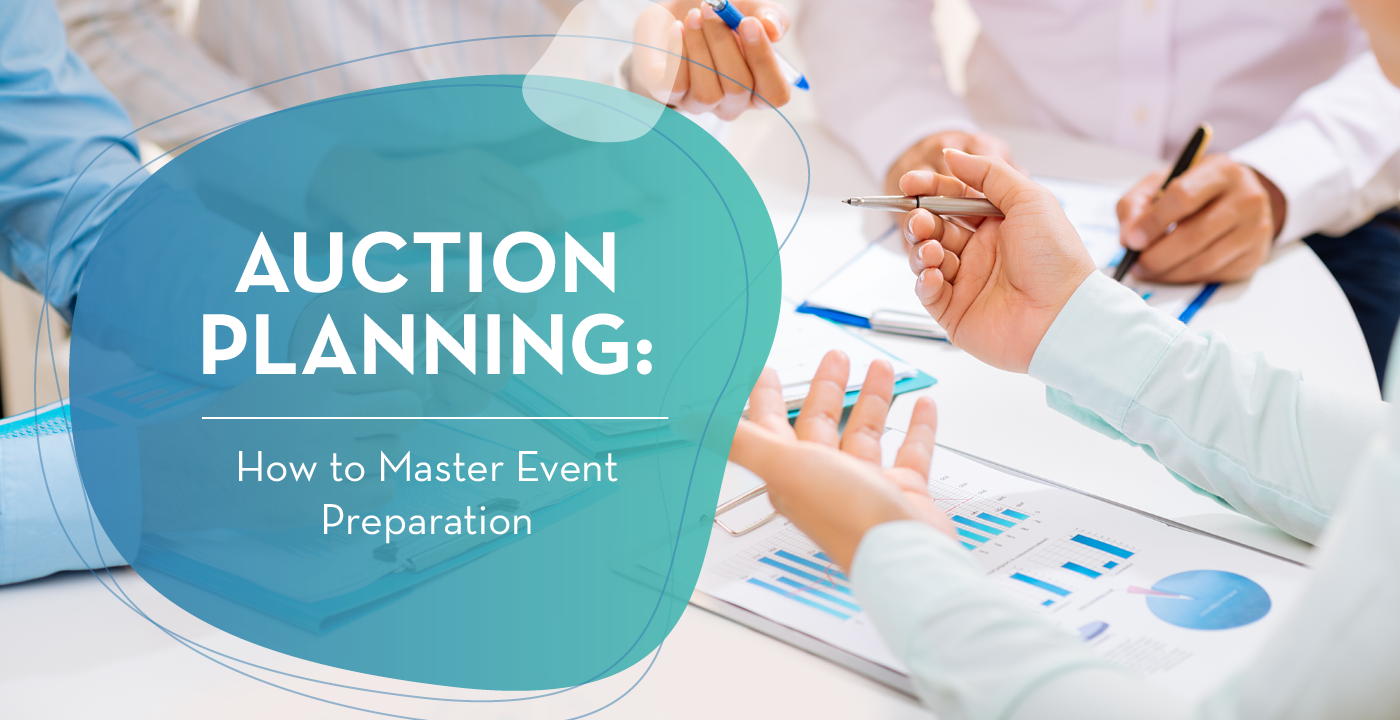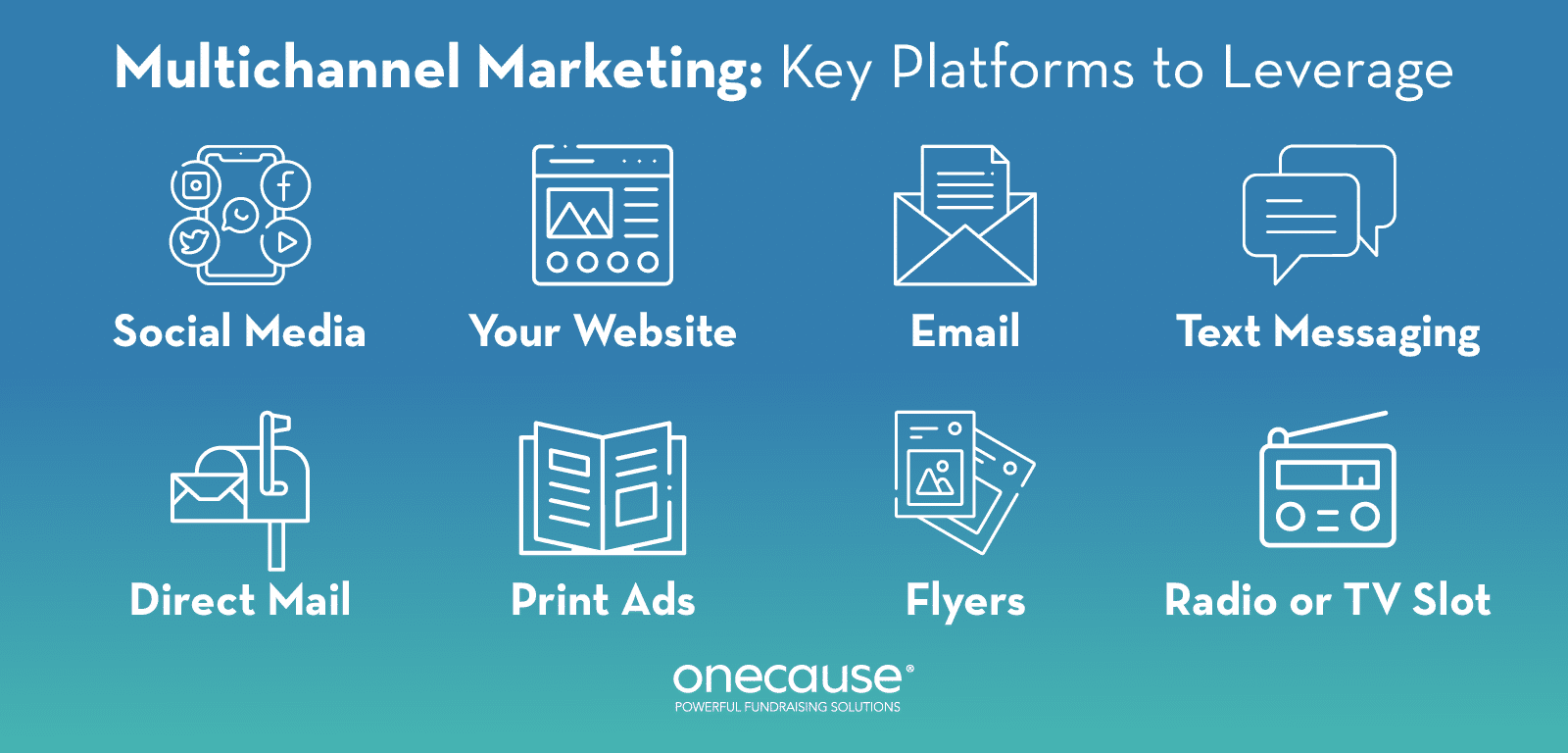 You’re likely familiar with the planning chaos before a fundraising event like an auction: your team is scrambling to polish off details, items seem to be missing, and you’re in the midst of trying last-minute strategies to drive more registrations. This has probably left your team wondering, “How can we avoid these issues and streamline our planning in the future?”
You’re likely familiar with the planning chaos before a fundraising event like an auction: your team is scrambling to polish off details, items seem to be missing, and you’re in the midst of trying last-minute strategies to drive more registrations. This has probably left your team wondering, “How can we avoid these issues and streamline our planning in the future?”
Auctions have many moving parts, so to effectively set these events up for success, you’ll need a strategy to keep your event preparation organized and on schedule—whether you’re hosting your auction in-person, online, or as a hybrid combination of the two.
In this guide, we’ll go over the following steps to help you master event preparation:
-
Determine your auction type.
-
Plan your budget early.
-
Put together a team.
-
Begin obtaining auction items.
-
Market your auction.
Your members expect a positive event experience. Meet and surpass this expectation by giving your association’s team plenty of time and structure to design an unforgettable auction.
1. Determine your auction type.
Before you get started with planning logistics for your event, you need to determine which type of auction you will host. The most popular choices include:
-
Live: A classic live auction typically takes place in person and requires your audience members to bid in real time with paddles or digital tools. Your auctioneer will announce each item and determine the winner.
-
Silent: During a silent auction, participants can view auction items and record their bids, silently competing with other attendees for the items of their choice. Rather than relying on traditional paper bids (which can quickly get disorganized), the OneCause guide to running a silent auction recommends using mobile bidding software so members can conveniently enter in their bids right from their phones.
-
Virtual: A virtual auction is a great choice if you’re hoping to reduce overhead costs and allow as many members as possible to take part in your event, no matter where they are. You can host a live or silent auction on a virtual platform, but remember you’ll have some additional technical considerations to manage!
Your auction type should align with what’s best for your audience. For example, if your association gathering will be on the smaller side, consider hosting a live auction so everyone can be together. However, if your association has members across the country, a virtual silent auction can help you maximize attendance and engagement.
To combine the best of both in-person and virtual elements, you might opt to host a hybrid auction. For example, you can invite your local or most veteran members to an in-person gathering for your auction, then have the rest of your members join remotely. Consider your goals and what makes the most sense for your association.
2. Plan your budget early.
Once you determine your auction type, it’s time to map out your budget. Setting your budget early in the planning process can help you create parameters and ensure you plan an auction within your means.
Start by creating a rough outline of your auction components. Will you serve a meal? Host your event at an upscale venue? Livestream your event? Invite special guests? Knowing what your auction will involve can help you determine a working budget.
As you’re planning your budget, it’s also important to set concrete fundraising goals. This will help you set a clear vision for your target attendee numbers, average bidding amount, number of corporate sponsors, and other key objectives. By understanding your goals, you’ll know if you need to adjust your budget to designate more funds towards a certain area of your event planning, such as investing in better technology to run an online auction.
3. Put together a team.
Your team can be made up of volunteers, members of your staff, and board members. Whoever you decide to bring on, make sure that they’re involved early. This way, your team will have enough time to step into their roles with confidence and bring your event to life.
Here are the different types of team members to recruit for your auction:
-
Emcee: Your emcee, or the host of your auction, is responsible for getting the audience excited about the event, managing the event schedule, and ensuring everything runs smoothly.
-
Auctioneer: Your auctioneer is different from your emcee, as they will be responsible for actually auctioning off and transitioning between the items during a live auction event. However, if you’re hosting a silent auction using paper bidding sheets or mobile bidding software, you likely won’t need an auctioneer.
-
Auction leads: Item procurement, management, and delivery can be complicated, so you’ll need a dedicated team to procure appealing items and packages for auction. They’ll also be in charge of distributing items to the winners.
-
Volunteer coordinator: If you’re hosting a large-scale auction, you’ll need extra hands on deck. Your dedicated volunteers are ready to help, but they’ll need someone to go to for instructions or questions. That’s where your volunteer coordinator comes in.
-
Technology support: Technology can play a big role in the success of your auction, so ensure everything flows smoothly with the help of knowledgeable tech leads. Your tech support team should be able to manage and oversee your mobile bidding software, run the livestream for your online fundraiser, set up speakers and microphones for an in-person event, and handle any other tech needs.
During your event planning, express appreciation to all of your team members so they feel valued and motivated to see your goals through. Fundraising Letters recommends spotlighting your event planning committee on your social media or email newsletter, sending digital thank-you notes, and gifting your team with branded merchandise.
4. Start procuring auction items.
Now that you’ve determined the format for your auction and assembled your team, you can start procuring your auction items. The right items and packages can help you maximize participation and revenue from bids, so consider your association’s member base and what would make them the most excited to get involved in the action.
One way you can ensure that you acquire the most appealing items is by creating attendee personas. An attendee persona is a representation of a specific type of person who is likely to attend your event. Build your personas using demographic information, such as:
-
Age
-
Location
-
Occupation
-
General interests
With your attendee personas, you can pick an array of items that you think each persona would be interested in. However, it can be easy to lose track of the status of your item procurement when you’re juggling so many requests. Work with comprehensive auction software that allows you to easily record details like each item’s name and number, the name and contact information of the item’s donor, and the item’s starting bid and minimum raise.
To support your item procurement efforts, you can also build relationships with local companies. If you know of a business that is looking to get more involved in the community, reach out to them about the auction and see if they would be interested in donating items or services.
5. Market your auction.
Just as you should carefully plan every step of your auction, you should also design an effective marketing strategy to reach as many people as possible. To successfully market your auction, you should:
Start early
While you’re acquiring items, begin fleshing out your marketing strategy. This way, once you’re putting the finishing touches on the auction, you can start promoting your event.
Preview items ahead of time
You spent all that time procuring your auction items for a reason! Advertise your most interesting or valuable items ahead of time so that attendees can see what they could win.
Use a multi-channel approach
As you put together your marketing materials, plan to share them across multiple marketing channels. These include:

-
Social media
-
Your association website
-
Email
-
Text messaging
-
Direct mail
-
Print ads
-
Flyers
-
Radio or TV slot
This way, you can reach more people and ensure that your audience sees your advertisements one way or another.
Tailoring your marketing materials to fit your attendee personas can be a very effective way to maximize attendance. For instance, the marketing materials that you use to attract young professionals might be different from the strategy you use for long-time association members, so consider your audience and their interests and preferences.
Wrapping Up
Auctions are a popular fundraising idea among schools, nonprofits, and associations for a good reason—they can bring in plenty of revenue when planned correctly! Take at least two months to lay the groundwork for your event and make sure to set deadlines to create a sense of accountability across your team. With a ready-to-go gameplan, it’ll be much simpler to organize an auction that will “wow” your members!
About the Author
 Karrie Wozniak
Karrie Wozniak
Karrie has spent more than a decade bringing innovative technology and fundraising strategies to the nonprofit industry. As one of the first executives at OneCause, Karrie combines her 20 years of experience in marketing with her passion for helping nonprofits expand their reach, leading industry research, marketing strategy, and fundraising consulting initiatives. She is also an active speaker on donor and fundraising trends, and has been featured on Forbes.com, Philanthropy Journal, and Nonprofit Hub.
